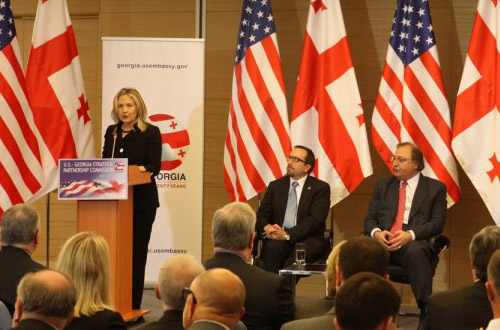| Clinton on Key Areas of Partnership with Georgia |
| Civil Georgia, Tbilisi / 5 Jun.'12 / 11:41 |

Secretary Clinton speaks at an opening of the U.S.-Georgia Strategic Partnership Commission session in Batumi on June 5. U.S. ambassador to Georgia John Bass (center) and Georgia’s Foreign Minister Grigol Vashadze (right). U.S. Embassy Photo
U.S. Secretary of State Hillary Clinton, who is visiting Georgia, reviewed four priority areas of bilateral cooperation while opening the U.S.-Georgia Strategic Partnership Commission session in Batumi.
The commission was established under the 2009 strategic partnership charter between the two countries, which sets a framework of bilateral cooperation, covering four priority areas, involving democracy; trade and economy; defense and security; people-to-people contacts and cultural exchanges.
Democracy
In her opening remarks, the U.S. Secretary of State said that the two countries shared “common goals and common interests”
She said that Georgia had “taken important steps” since the Rose Revolution and Georgia’s “progress has been noted worldwide.”
“Now it is up to Georgia to consolidate your democratic gains. That is the key to Georgia’s future and it will bring Georgia closer to achieving your Euro-Atlantic aspirations,” Clinton said.
The parliamentary elections this fall and presidential election next year are opportunity for Georgia “to deepen its democracy and strengthen the legitimacy of Georgia’s democratic institutions in the eyes of your public and of the world,” she said.
“We urge Georgia’s leaders to ensure that it will be a competitive campaign and the elections are free and fair” both during the elections day and in run up to it, Clinton said.
She said that creation of Inter-Agency Task Force for Free and Fair Elections (IATF) at the National Security Council of Georgia to prevent and react on possible electoral violations “is a good step.”
Clinton also welcomed introduction of financial incentives for political parties to encourage them recruit women candidates in their party lists for parliamentary and local elections.
She said that “more difficult and ultimately the more important work may well be ahead” in order to build habits and practices to sustain democracy over time, “which means not only holding of successful elections, but also going beyond elections and strengthening the other pillars of democracy that is labor rights, judicial independence, media independence and access.”
Trade and Economic Ties
She said democratic reforms would also help Georgia’s economic growth, adding that Georgia’s reforms, including economic ones, “have won international praise”.
“As Georgia continues to strengthen accountability, transparency and rule of law, you will see even greater interest and investment in your economy,” Clinton said.
She said that the U.S. and Georgia were now willing “to take our trade and investment relationship to the next level.”
Clinton noted importance of high-level dialogue “to strengthen bilateral trade relations, including the possibility of free trade agreement and updated investment agreement and other measures that would facilitate trade and investment.”
Defense and Security
She said that Georgia and the United States “already have strong bilateral defense cooperation.”
Clinton said that during a meeting in January the president of the two countries agreed to deepen that cooperation further in three areas: comprehensive assistance to support Georgia’s defense reforms and modernization; providing training and equipment necessary for Georgian troops participating in Afghan operations; improving Georgia’s self-defense capabilities and NATO interoperability.
She reiterated the U.S. support to Georgia’s NATO aspiration and said during the Chicago summit the allies had agreed that Georgia was continuing important progress for meeting NATO standards.
People-to-People Contacts
On people-to-people contacts she said that the U.S. had taken steps to make it easier for Georgians to travel to the United States.
Clinton also said that she would announce steps that would make “easier for the residents of the separatist regions to visit the United States.”
“We reject Russia’s occupation and militarization of Georgia’s territories and call on Russia to fulfill its obligations under the 2008 cease-fire agreement, including withdrawal of its forces to pre-conflict positions and free access for humanitarian assistance,” Clinton said.
She said that the two countries have achieved a lot in their bilateral cooperation over the past twenty years and “we have many reasons to be optimistic about what the future holds.”
After opening the Strategic Partnership Commission session, the U.S. Secretary of State met with opposition representatives and then participated in a ceremony of commissioning of two Georgian coast guard patrol boats, renovated and modernized with the U.S. funding.
‘U.S. Assistance Powerful Catalyst of Reforms’
Speaking at the opening of the U.S.-Georgia Strategic Partnership Commission, Georgian Prime Minister Nika Gilauri said that the U.S assistance “is a powerful catalyst of democratic transformation and reform process” in Georgia.
“We believe that free trade agreement between Georgia and the United States will have a huge political and economic significance for the both countries,” he said.
PM Gilauri said that for Georgia “it is a priority to move our cooperation in the defense and security sphere to a higher level that also includes assistance in increasing Georgia’s self-defense capacity and continuous support in the process of Georgia’s NATO membership.”
He expressed Georgia’s gratitude towards the United States for its “constructive position” at the Chicago summit and thanked the U.S. for its “unwavering support” to Georgia.
“As an aspirant country we will continue moving down the path of NATO membership,” Gilauri said.
He also said that Georgia was proud of its contribution to ISAF operation in Afghanistan and stressed that Georgia would soon become the largest non-NATO contributor to the Afghan operations.
